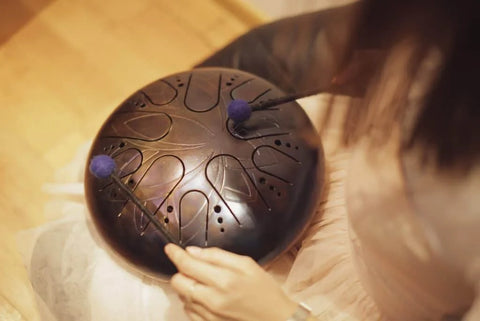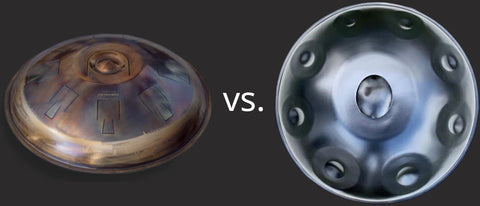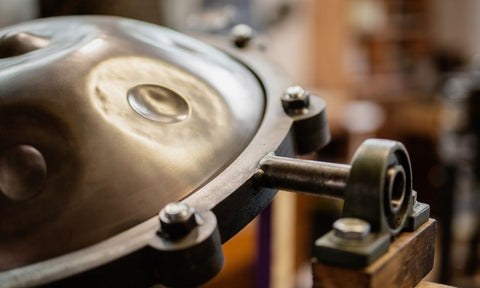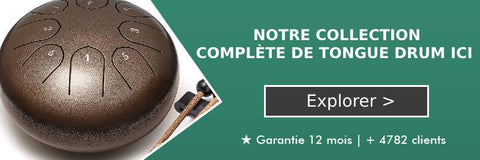In this article, we will explore the subtle distinctions between two instruments modern who enrich the universe of the percussion and of well-being musical : the Handpan and the Tongue Drum.
Born in the 21st century, these percussion instruments They certainly share characteristics, but reveal their own identities, far from the image of "twin brothers" that one might attribute to them.

Through a thorough analysis, we will guide you in choosing between these two jewels of the musique, whether you are looking for a hang drum or a tongue drum, whether used or new, highlighting what makes each instrument unique.
Also to read: Comment apprendre à jouer du Handpan ?
1. Handpan and Tongue Drum are diatonic instruments
Percussion instruments, the Tongue Drum and the Handpan are diatonic instruments, that is to say that they do not count all the grades of the color range.
The first difference appears here. The Tongue Drum is a pentatonic or heptatonic instrument, that is to say it includes five or seven notes per octave.
The Handpan, for its part, can also be hexatonic, that is to say to include six notes per octaveIt is quite rare, but since it exists, it is worth mentioning.
a. Range and tone
The Tongue Drums and Handpans are both jewels of percussion, offering an immersion in the bien-être Their enchanting sound quality. However, a fundamental distinction lies in their diatonic musical structure, which clearly differentiates them from chromatic instruments, the latter incorporating all possible notes of an octave.
The Tongue Drum, usually tuned in pentatonic or heptatonic scales, offers five to seven notes per octave, creating a soft and melodic harmony, ideal for relaxation and well-being. This ease of access makes it particularly appealing to beginners in music.
b. Variety and complexity
The Handpan, with its ability to be tuned in hexatonic scales, adds an extra note per octave, offering a slightly richer harmonic quality. This hexatonic specificity, although rarer, illustrates the diversity and complexity that the Handpan can achieve, thus appealing to more experienced musicians or composers in search of new sound textures for their works.
c. Choice according to the musical profile
The choice between a Tongue Drum and a Handpan is therefore shaped by the personal search for sound and the desired musical experience. The Tongue Drum, with its limited range, encourages an approach meditative and intuitive, perfect for well-being.

In contrast, the Handpan offers a broader palette for musical exploration, suitable for musicians wishing to experiment with more elaborate compositions. These features make the Handpan a popular choice among experts, while the Tongue Drum remains accessible and appealing to beginners or those in search of simplicity.
In summary, the choice between these two instruments will depend on themusical experience sought after, from the desired range and for the intended use, whether for relaxation with a Handpan 432 hertz, the composition with a 440 hertz, or simply to get started with percussion music.
Ready to explore the enchanting melodies of the handpan? Discover our collection ofdiatonic instruments, crafted with passion for a unique musical experience. Explore the enchanting sounds of the hang drum and let yourself be transported by its harmonious vibrations.
Visit our store starting today and find the perfect handpan for you!
2. The frequency of the Handpan and the Tongue Drum
The Handpan can be played, depending on the instrument, on two frequencies:
- 440Hz,
- 432Hz.
The Tongue Drum can also be played at these two frequencies; however, most tank drums are tuned to 440hz.
What consequences does this entail? Simply the possibility of playing or not in an orchestra. Indeed, the frequency of 440Hz is the frequency that the Italian government chose to impose on all orchestras in 1885. While originally, the standard frequency was 435Hz, and the French frequency, 432Hz.
In other words, if you want to play in a group like Hang MassiveYou will need to choose the frequency of 440Hz, intended for both instruments.
3. Orchestral compatibility and well-being
The frequency at which an instrument is tuned influences not only its ability to integrate into musical ensembles but also affects the listening experience in terms of well-being. Here are the key points to consider:
- Orchestral integration
Choose the frequency of 440Hz guarantees compatibility with the majority of modern orchestras and musical ensembles. This is crucial for musicians aspiring to play in groups or to integrate into larger compositions.
- Relaxation experience
The frequency of 432Hz, often associated with therapeutic and relaxing properties, offers an interesting alternative for those who use their instrument primarily for personal well-being or meditation sessions.
- Personal choice
The decision between 440Hz et 432Hz It will depend on your musical aspirations. Whether you aim for a group performance or a wellness-centered use, the Handpan and the Tongue Drum offer flexible options to meet your needs.
This flexibility makes the hang drum and the Tongue Drum particularly suitable instruments for various musical contexts, from concerts to meditation circles, as well as individual well-being practices.
Handpan and Tongue Drum: a symphony of well-being. From solo to orchestra, explore the unsuspected harmonies of these magical instruments and let yourself be carried away by their relaxing vibrations.
Discover our collection and find the ideal musical partner for your sound journey!
4. A different game between the Handpan and the Tongue Drum

The Tongue Drum has metal tongues numbered from 1 to 7. Each number corresponds to a note, from C to B. The percussion can be done with hands or with chopsticks.
In contrast, the Handpan has no numbering and, instead of metal tongues, there are dimples, called Dimple In English. These dimples each allow for a note to be played, but are not marked.
The accuracy of the sound of the Handpan greatly depends on the precision with which the instrument maker has hammered the structure metallic. Le steel hang drum is therefore a more complex instrument to make, but we will come back to it.
5. A very different size and weight
The size isn't everything, that's the reality of steel Tongue Drum, small but heavy instrument, compared to its big brother the Handpan. Indeed, the Tongue Drum can weigh up to 8 kilograms while the Handpan generally weighs only 5 or 6 kilograms.

The reason lies in thethickness of the metal utilisé pour assurer la sonorité de ces nouveaux instruments. The Tongue Drum demande un métal plus épais que celui du Handpan, il est donc plus lourd, mais aussi plus résistant.
The fall of a Tongue Drum will not damage the sound quality. On the contrary, if you drop your hang drum, there is a high chance that the instrument will be out of tune. Why? Because the sound of the Handpan The sound of its dome relies entirely on its shape. A deformation, even caused by heat, immediately affects the accuracy of its notes.
6. A price difference
Although heavier, the Tongue Drum is approximately less expensive than the Handpan. The reason lies in the fact that this instrument requires a much lower level of technicality than that needed for the manufacturing of a Handpan.
Indeed, the Handpan cannot be machined; it must be made by hand and not by just anyone. To hammer the dome of a Handpan, in order to give it a shape and a sound covering an octave accurately, two years of practice are generally required.
Therefore, the price of the handpan is correlated to the technical difficulty of making it. To choose between the two instruments, listen to their melody and choose the one you prefer.
You want buy a handpan ? Discover our different models and order the one you like the most.
7. Comparative Table: Handpan vs Tongue Drum
| Criterion | Handpan | Tongue Drum |
|---|---|---|
| Musical Range | Hexatonic, Heptatonic | Pentatonic, Heptatonic |
| Complexity | Suitable for experts | Ideal for beginners |
| Frequencies | 432Hz (well-being), 440Hz (orchestra) | Mostly in 440Hz |
| Usage | Composition, Relaxation | Wellness, Meditation |
| Integration | Flexible for solo or group | Mainly solo or small groups |
| Choice for | Musical experimentation | Intuitive and meditative approach |
In conclusion
Although the Handpan and the Tongue Drum share some origins and some acoustic principles similar, their differences in terms of range, complexity, and frequencies offer a richness and diversity that meet a variety of musical and wellness needs.
Whether you are a beginner or experienced musician, in search of relaxation or integration into a musical ensemble, choosing between these two instruments comes down to defining your personal journey in the fascinating universe of percussion music.
Ready to create your own symphony ? Explore our collection of handpans and diatonic tongue drums, perfect for enchanting melodies solo or relaxing harmonies in a group. Discover the sound that suits you and dive into a unique musical universe.
Visit our store Starting today and unleash your creativity!
FAQs
1. What is the best choice for a beginner, the Handpan or the Tongue Drum?
For a beginner, the Tongue Drum is often recommended due to its simplicity and ease of play. It allows for an intuitive approach to music, ideal for those exploring percussion for the first time.
2. Is the Handpan suitable for musical composition?
Absolutely. The Handpan offers a varied range and a rich sound that stimulates creativity. Its flexibility in hexatonic and heptatonic scales makes it an excellent choice for composers looking to add a unique touch to their works.
3. Can you play the Handpan or the Tongue Drum in a group?
Yes, both can be played in a group. However, the Handpan, with its frequency of 440Hz, integrates more easily into orchestral ensembles, while the Tongue Drum is often used in more intimate contexts or for solo performances.
4. Does the frequency of 432Hz have an effect on well-being?
The frequency of 432Hz is renowned for its relaxing and therapeutic qualities. Both the Handpan and the Tongue Drum tuned to this frequency can promote relaxation and well-being, providing a meditative listening experience.
5. Where to buy a quality Handpan or Tongue Drum?
Specialized music instrument stores and some online sites offer quality Handpans and Tongue Drums. For a handpan purchase, prioritize handpan stores or reputable handpan shops known for their expertise and the quality of their instruments.






Lefour
Merci pour vos explications je recherche un son très fin pour la méditation et le soin